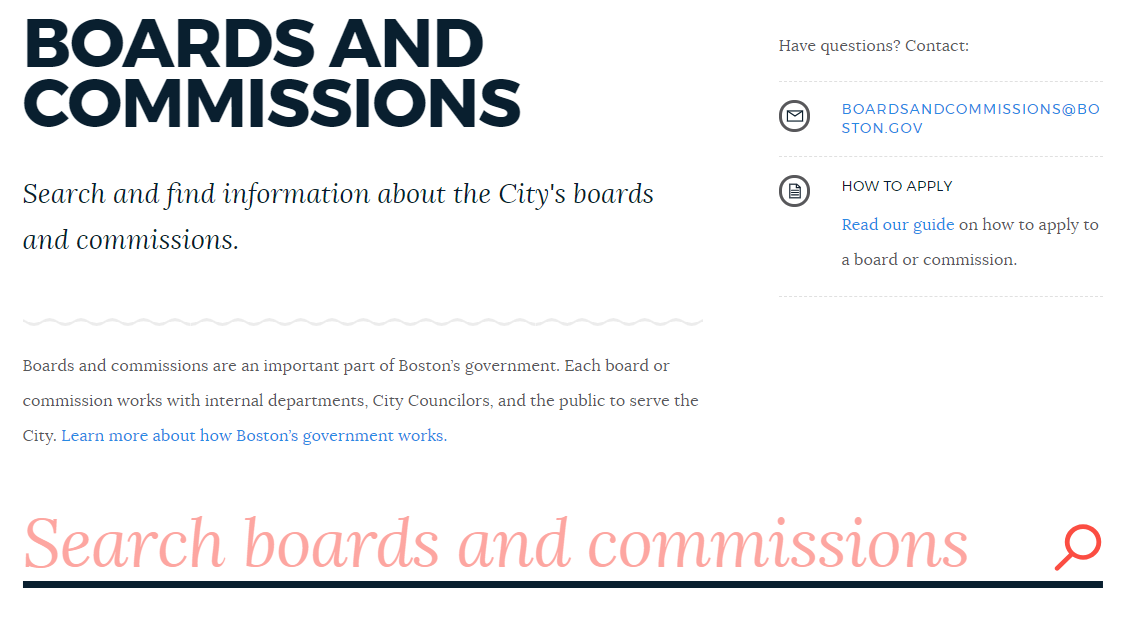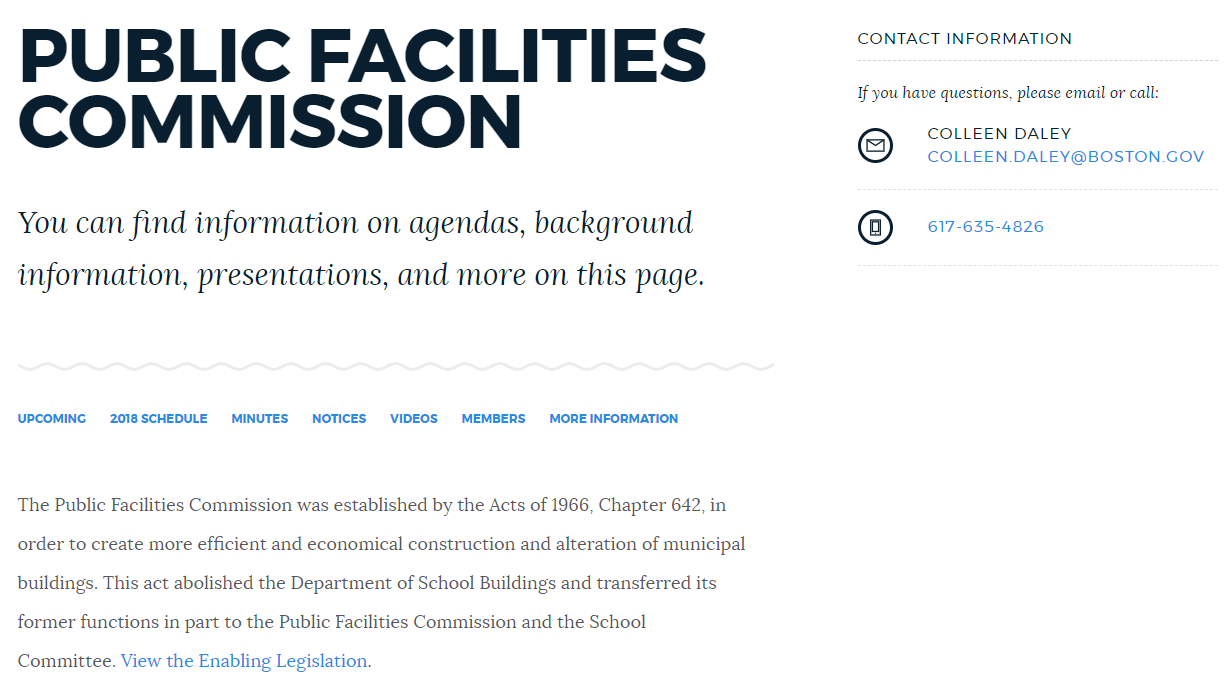Boards and commissions get a deserved Boston.gov facelift
We made updates to an important — but often overlooked — part of the City’s old website.
Did you know Boston has close to 50 boards and commissions across the City? These bodies work with departments and the public to help make Boston a better City. Serving on them is one of the best ways you can become more engaged in civic life.
We’ve moved the majority of our pages from the old City website over to Boston.gov. But, there are still a few old, legacy applications that have forced us to take a step back and rethink things. Our old boards and commissions page was one of them.
Looks can be deceiving
At first glance, this simple app looked like it would be pretty easy to move over to Boston.gov. We just had to create a bunch of pages with basic information, list the members out with supporting documents, and then we’re done. We didn’t realize just how tricky things were until we looked under the hood.
The information flowing into these pages was actually using a database that is maintained by the City Clerk’s Office, with the help of the Mayor’s Policy Office. There was also an application hooked into the app that would change depending on what page you were on. Users were able to apply to specific boards and commissions, with the option of applying for up to five at one time.
With all those considerations, we decided to take a step back to give this small but vital app the attention it deserved.
Cleaning up the data
Before we even started work prototyping what these new pages would turn into, we had to make sure we had clean data. Working with the City Clerk’s Office and the Mayor’s Policy Office, we reached out to the more than 50 boards and commissions that existed on the old site.
City Clerk staff had already been doing a great job maintaining the pages on the old City website. Our work just had the added benefit of dusting off some cobwebs in the system. We were able to clean up data for a majority of the pages, and even decommissioned a few no longer in use.
Over the course of a few months — and many emails — we were able to confirm that the information in the database was up-to-date. Now, we had to figure out what this information would look like on Boston.gov.
A page for everyone
Through the original web app, a user was able to view information on the different boards and commissions through a filtered search. The app featured dropdown menus that allowed you to filter by policy area, or by picking the actual board or commission. While this dropdown functionality was easy enough to use, it wasn’t easy to search and find information. This was true whether searching on Boston.gov or through search engines, like Google and Bing. Each individual board or commission page had few details, and limited potential to add additional information. You also had to be on a desktop to see the information, or else use a lot of pinching and zooming on your phone.
We decided to focus our efforts on creating pages integrated into Boston.gov. Aside from making these boards and commissions easier to find through search, we were also giving them potential for future improvements. Meeting agendas, minutes, and more could all be easily added to pages using our content management system, Drupal.
The challenge for us was figuring out a way to feed the information from City databases to these individual pages on Boston.gov. We wanted to set up a system where, after the City Clerk’s Office made a change in the database, that information would automatically update on Boston.gov.
Staying modular with components
To take advantage of existing page types on Boston.gov, we focused on building boards and commissions “components.” What’s a component? It’s an addition to a webpage that allows you to add text, link to other pages, and add any information you want. We can stick these components onto any page on Boston.gov, and drag and drop them where we see fit.
For our boards and commissions information, we created three separate components:
- one component pulled data for specific board and commission details
- another component pulled information for current board and commission members, and
- a third component was placed in the sidebar to pull in contact information.
We also used member data to add another cool feature to individual pages. If there’s a vacancy on a board or commission, an “apply online” button appears allowing you to apply for that opening.
From there, all we had to do was create each individual page on Boston.gov and drop the components on them. We now have easy-to-find and searchable pages for each board and commission integrated into Boston.gov.
To house all of these new pages, we created a boards and commissions search page. This page allows you to search by title, filter by policy area, and even filter by boards and commissions with open seats. The application itself also got a facelift. Aside from using Boston.gov branding, we made the application mobile-friendly and easier to use.
Interested in diving more into the technical details and code behind our boards and commissions work? Feel free to check out our source code on Github.
Potential for the future
Revamping the boards and commissions section of the City’s website was just step one in this process. Aside from enhancing the experience for the public, we’ve also attempted to make maintaining this data easier for City staff. Thanks to the help of our colleagues at the Department of Innovation and Technology, tweaks were made to the database to allow for better sharing of information. In the future, it will be a lot easier for the Mayor’s Policy Office and the City Clerk’s Office to let each other know about vacancies and new members.
Many of these pages still have limited information. But, by being built in Drupal, we’ve made it easier for staff to add more to what already exists. One great example is the Public Facilities Commission. Commission staff members have gone back and added meeting minutes, agendas, and even videos of meetings. They also have a section listing all of the upcoming meetings dates for the year. With a simple layout and design, the Public Facilities Commission now has an easy-to-understand and transparent resource.
On the surface, it might seem like boards and commissions are a minor aspect of municipal government. But, these public bodies are a vital way for the public to offer their input on what’s happening in the City. By joining a board or commission, you can bring your expertise or passion to a topic you hold dear.
So, are you interested in serving on a board or commission? Make sure to go through our list on Boston.gov. If you see an “apply online” button, there’s an open vacancy that the City needs to fill. You can also check out our how-to guide for getting involved.




